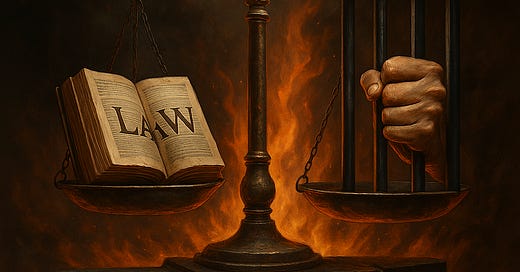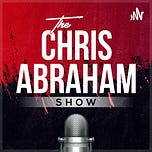So here we are. Another news cycle, another warning shot.
Mahmoud Khalil, a Palestinian graduate student, held for over 100 days in a Louisiana detention center—LaSalle, to be exact—because the same American legal infrastructure built to protect vulnerable communities has now been weaponized to crush one of its own. Let that sink in.
Let me say it another way: the laws that were forged in the righteous fires of civil rights—anti-hate legislation, campus safety codes, foreign policy carveouts, and protective civil language—were used to shove a student activist into an ICE facility, where he sat for three months before being spit out into the New York streets like a spent cartridge.
These laws were built like weapons, and now that weapon is in the hands of a different wielder.
The Law as a Forge
The forge is the right metaphor here. Think about it. The forge is not the final product—it’s where things are shaped. The fire doesn’t care what you throw into it: a sword, a horseshoe, a branding iron. It’s heat and pressure, and what comes out is up to the one doing the forging.
We’ve spent the last 60 years forging laws in this country to protect vulnerable people. Black Americans, Jewish Americans, women, LGBTQIA folks, immigrants, refugees, students, non-native speakers. And in the beginning, these laws were forged out of blood and tears and justice. Brown v. Board. Title IX. The Civil Rights Act. The Hate Crimes Statistics Act.
The idea was: let’s shape a society where the most vulnerable are protected.
But we forgot something—or we deluded ourselves into thinking it wasn’t possible: laws are neutral once written. They are tools. Once codified, they don’t ask who you voted for. They don’t care who you prayed to when you passed them. They are there to be interpreted and enforced. Period.
And here we are. The left forged the blade. Now the right wields it.
What Happened to Mahmoud Khalil?
Khalil was a green card holder. He was leading pro-Palestinian protests at Columbia University. And because the political climate has shifted—because it’s 2025 and we’re in Trump’s second term—those protests were no longer seen as protected speech. They were seen as foreign agitation. As extremism. As dangerous.
So what did they do? They dusted off a Cold War-era immigration statute—originally meant to prevent Soviet spies from entering the U.S.—and they used it to arrest him, detain him, and try to deport him.
Three months in a rural Louisiana holding pen. For signs and slogans. For a speech.
And don’t forget: this happened under the same set of laws that were passed to prevent people like Mahmoud from being profiled and detained without cause.
You can’t make this up. Or maybe you can. Because this is America, and this is what we do.
Words Are Violence—Until They’re Not
Remember the "words are violence" era? Remember safe spaces? Trigger warnings? Professors being fired for saying things that caused emotional discomfort? Comedians banned from campuses? Entire departments frozen with fear that the wrong syllabus could be a career-ending landmine?
That was all built on the premise that speech can harm, and that institutions have a duty to protect the vulnerable from that harm. And that idea—that speech has consequences—led to some good. Harassers got expelled. Racists got shut down. Misogynists got exposed.
But it also led to a culture where intent no longer mattered, interpretation was weaponized, and vulnerability was currency.
Fast forward: now those same rules are being invoked to silence you. To silence Palestinian solidarity. To cancel academic freedom. To deport a green card holder for holding up a sign.
Is it justice? Is it irony? Or is it just the inevitable consequence of turning every disagreement into a matter of policy and every policy into a weapon?
The Boomerang Effect of Legal Power
Once you build a legal framework powerful enough to silence a Klan rally, don’t be surprised when someone uses it to silence a Gaza teach-in.
That’s the boomerang.
You throw it with all your might—righteousness, moral clarity, solidarity—and then years later, you see it coming back with a different logo on it.
It’s not just Mahmoud. It’s a growing pattern:
Rümeysa Öztürk, detained for “foreign interference.”
Mohsen Mahdawi, questioned and detained under citizenship fraud claims.
Faculty being disciplined under antisemitism clauses for pro-Palestinian activism.
Every law, once passed, becomes a chess piece on the board of history. And eventually, someone smarter than you picks it up.
The Original Protected Classes
Don’t forget who these laws were first meant to protect. Jewish Americans. Black Americans. After WWII. After Jim Crow. After Tulsa. After Treblinka.
These laws weren’t born from Tumblr. They were born from genocide. They were born from Holocaust museums and lynching trees and segregated water fountains. The weight of that history made hate crime legislation feel sacred.
But then we expanded it. Rightfully, maybe. To include gender, sexuality, identity, expression, microaggressions, emotional violence.
And eventually, we got sloppy. We built a bonfire. And now the fire is out of control.
Because now, when Jewish students say they feel unsafe hearing “From the river to the sea,” they’re invoking the same policies that used to protect queer students from Westboro Baptist protests.
And the state listens.
Moral Judo, Political Karma
Everything has an equal and opposite reaction. You teach the world that harm is subjective, and then someone else says your words harmed me. You say speech can be violent, and now your speech is deemed violent.
We’ve seen this before:
RICO laws, written to take down the mob, now used on protest groups.
Title IX, written to protect women, used to erase due process.
Statutes of limitations, extended to prosecute rapists, used to dredge up 40-year-old political accusations.
What you create in the name of justice will be used in the name of revenge.
And here’s the kicker: it works.
From the Forge to the Front Line
The thing about forges is that you don’t control what people do with the weapons once they leave the fire.
You made the speech codes.
You made the hate crime laws.
You made the campus policies.
You made the safe spaces.
You made the weapon.
And now, it’s pointed at you.
Mahmoud Khalil sat in a cell because the law said he could. The law didn’t ask who wrote it. The law didn’t care that it was born from Selma and Auschwitz. The law saw a target and struck.
That’s what laws do.
Final Thought: You Built the Bomb
You can’t invent the nuclear bomb and then complain when someone else gets one. That’s what we’re seeing now.
You forged these laws. You enshrined them. You moralized them. You turned them into holy writ. And then, when someone else picked them up and used them against your cause—you cried foul.
But it’s too late. The genie is out. The weapon has been passed. The spellbook is public domain.
And the only question left is: what now?
The forge doesn’t care what you make in it.
It only cares that it’s hot enough to burn.
Let me know if you want to keep expanding this—there’s a lot more heat where this came from.
—Chris
tl;dr
The provided text argues that anti-hate laws, initially crafted to safeguard vulnerable groups and promote civil rights, have been misappropriated and weaponized. The author contends that these laws, once seen as progressive tools, are now being used to suppress dissent and activism, particularly against pro-Palestinian voices, as exemplified by the case of Mahmoud Khalil. The text uses the metaphor of a "forge" to illustrate how laws, though forged with good intentions, become neutral tools that can be wielded by any political side. Ultimately, the source suggests that the broadening of what constitutes "harmful speech" has created a "boomerang effect," where legal frameworks designed to protect are now being used to silence those they were originally intended to help.













Share this post